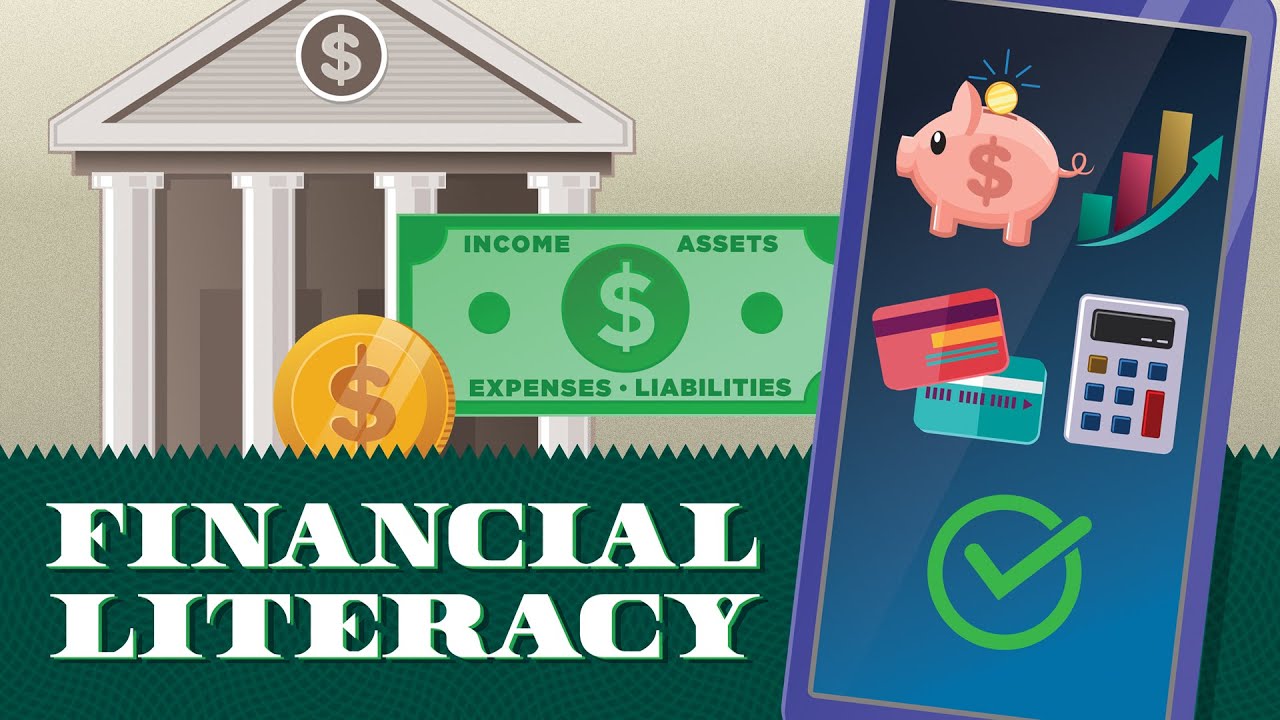MATERI KONSEP KEUANGAN DAN PENGELOLAAN KEUANGAN KELUARGA Kelas VII Semester Genap #UANG
Summary
TLDRThis lesson explores the concept of financial management, focusing on key topics such as money, income, savings, investment, and financial literacy. Students learn how to manage finances effectively, starting with basic understanding of money and transitioning into more advanced ideas like investments and financial planning. Emphasizing the importance of budgeting, setting financial goals, and managing expenses, the lesson encourages good financial practices to achieve long-term stability. Practical examples, including different types of financial tools like credit cards, debit cards, and investments, help students relate to real-life situations and understand the importance of financial planning from a young age.
Takeaways
- 😀 Money is an essential tool for transaction and meeting life's needs, replacing the barter system that lacked a standard value for exchanges.
- 😀 Financial literacy is crucial for understanding how to manage money effectively, including making decisions on spending, saving, and investing.
- 😀 There are two types of money in Indonesia: 'Uang Kartal' (physical currency) and 'Uang Giral' (bank deposits or digital money).
- 😀 Income (pendapatan) is money earned from activities, but it doesn't always guarantee financial sufficiency if not managed well.
- 😀 Savings (tabungan) refers to money saved from income and not used for daily expenses, whereas investments aim to grow wealth over time.
- 😀 Investment helps increase the value of money, such as through stocks, mutual funds, or even buying livestock that can be sold for a higher price later.
- 😀 Financial literacy means understanding how to manage money wisely, like knowing how to allocate funds for future use or savings.
- 😀 Good financial management is not only the responsibility of parents but also involves children, fostering family prosperity and stability.
- 😀 A key to managing finances effectively is setting financial goals for short, medium, and long-term plans, helping measure financial success.
- 😀 Proper planning and budgeting, such as allocating income for both immediate and future needs, are vital to avoid debt and unnecessary financial stress.
Q & A
What is financial literacy and why is it important?
-Financial literacy is the knowledge and skills needed to make effective financial decisions. It helps individuals understand how to manage money, including budgeting, saving, investing, and avoiding financial risks. In the script, it is emphasized that a lack of financial literacy can lead to poor financial management, like spending without planning.
How did the story of the child spending 800,000 Rupiah relate to the lesson?
-The child spending 800,000 Rupiah on a game illustrates poor financial management and the lack of understanding about money and budgeting. This example was used to highlight the importance of financial literacy in preventing unplanned and unnecessary expenses.
What is the difference between currency and giro money?
-Currency refers to physical money, like coins and banknotes, issued by the government, known as 'Uang Kartal'. Giro money, or 'Uang Giral', refers to non-physical money stored in a bank account and accessed through methods like checks or debit cards.
What is the primary purpose of savings?
-The primary purpose of savings is to set aside money from income that is not used for immediate expenses, to be used later for personal needs or emergencies. Savings help individuals avoid financial stress when unexpected expenses arise.
How does investment differ from savings?
-Savings are intended to keep money safe and accessible for future use, while investment aims to grow wealth over time by increasing the value of the money invested. Investments, like in stocks or real estate, offer returns on the initial amount over time.
Can you give an example of an investment?
-An example of investment from the script is investing in livestock, like buying goats or cows. The value of the animals increases over time, and when sold later, they generate a profit. Another example is investing in financial instruments like mutual funds or stocks.
What are the five goals of family financial management?
-The five goals of family financial management are: 1) To control spending; 2) To ensure essential needs are met; 3) To avoid financial risks; 4) To maximize investment returns; 5) To secure financial stability in the future.
What is the importance of setting financial goals?
-Setting financial goals provides a clear roadmap for managing finances effectively. Goals can be short-term (under one year), medium-term (1-5 years), or long-term (over five years). These goals act as benchmarks to measure success in achieving financial stability.
How can a family plan for financial management?
-Family financial planning involves creating a structured plan for income, expenses, savings, and investments. Families should prioritize their needs, set clear financial goals, and regularly review their financial situation to ensure it aligns with their objectives.
Why is financial management crucial in avoiding debt?
-Good financial management helps individuals avoid unnecessary debt by ensuring that income is used wisely and spending is controlled. Without proper planning, people may rely on loans or credit cards, leading to debt that can be difficult to repay.
Outlines

このセクションは有料ユーザー限定です。 アクセスするには、アップグレードをお願いします。
今すぐアップグレードMindmap

このセクションは有料ユーザー限定です。 アクセスするには、アップグレードをお願いします。
今すぐアップグレードKeywords

このセクションは有料ユーザー限定です。 アクセスするには、アップグレードをお願いします。
今すぐアップグレードHighlights

このセクションは有料ユーザー限定です。 アクセスするには、アップグレードをお願いします。
今すぐアップグレードTranscripts

このセクションは有料ユーザー限定です。 アクセスするには、アップグレードをお願いします。
今すぐアップグレード関連動画をさらに表示

Pemberdayaan Masyarakat

Materi IPS Kelas 7 Tema 04 Pemberdayaan Masyarakat || C. Pemberdayaan Masyarakat

Literasi Finansial + LKPD : Mengungkap Kunci Sukses Finansial sebagai Modal Kesejahteraan Masa Depan

Tema 4, Pemberdayaan Masyarakat, Sub Tema C. Pemberdayaan Masyarakat, IPS kelas 7 (Rangkuman)

This is Why Men Dominate in Finance | Finance Educator | Monika Halan Epi 44

Financial Literacy - Full Video
5.0 / 5 (0 votes)
